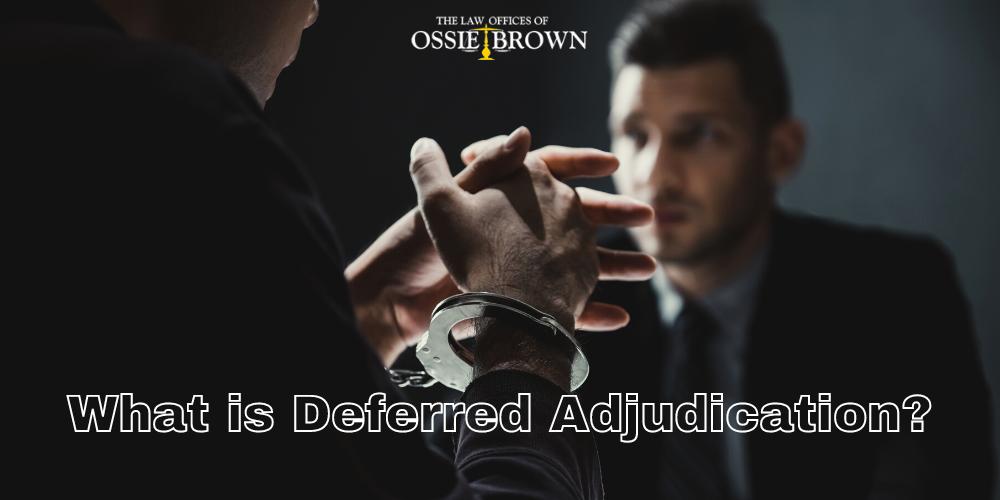Obviously, being found completely innocent in a criminal case is the best possible outcome. Given the details and evidence presented in a case, though, this outcome is not always possible, even if the defendant claims complete innocence. Pleading guilty to a charge or conviction has its benefits, too. In some criminal cases, defendants who plead guilty can avoid some prison time and keep their criminal records largely clear, especially if they agree to complete deferred adjudication in Louisiana and the judge decides that this is the best option. Below, our legal team breaks down the details of deferred adjudication including what it is, its pros and cons, its eligibility requirements, and more.
If you are facing a criminal charge or conviction in the state of Louisiana, you need a skilled attorney to protect your legal rights and guide you through the entire criminal procedure. Call a Baton Rouge criminal defense lawyer at 225-343-1111 to schedule a free consultation at our law firm.
What is Deferred Adjudication?
Deferred adjudication has many alternate names depending on the state and/or jurisdiction, including delayed adjudication, deferred sentencing, probation before judgment (PBJ), deferred entry of judgment (DEJ), and adjournment in contemplation of dismissal (ACOD).
Deferred adjudication is basically a type of plea deal that’s available in many states in order to avoid jail time and a tainted criminal record. Instead of going to jail (or completing a full jail sentence), the defendant may have to meet certain requirements under a judge’s discretion such as doing community service, undergoing a treatment program, and/or paying a certain amount of fines.
If a defendant pleads guilty and successfully completes the terms of their deferred adjudication, their criminal conviction may be dropped from their record. If not, the defendant will face harsher penalties and a tainted criminal record.
If your child is facing criminal charges, contact our Baton Rouge juvenile defense lawyers to see how we can help.
Deferred Adjudication Probation Louisiana
Probation is the release of a criminal defendant from jail as long as they demonstrate good behavior under the supervision of a probation officer. In other words, a person on probation is essentially on “community supervision.” They are out in the community, but they have to follow certain rules, meet certain requirements, and meet regularly with a probation officer.
In order to undergo a probation period, you must plead guilty to the crime you committed. Similarly to deferred adjudications, defendants may also be required to successfully complete a treatment program or a specific number of hours of community service.
Deferred adjudication is basically a form of probation, although there are a few differences between the two terms. Deferred adjudication probation means that the person has been convicted of a criminal offense and has submitted a guilty plea. They must complete a probationary period in order to avoid having a conviction on their criminal record. Regular probation, also known as non-adjudicated probation, means that the defendant has pleaded guilty to a criminal charge, not a conviction. In order to avoid a conviction, the defendant must undergo probation.
Deferred Adjudication Meaning: Pros and Cons
Depending on the defendant, the type of criminal charges or convictions they’re facing, and the state they’re in, they may not have much of a choice between delayed adjudication and regular probation. However, some defendants have a choice once they submit a guilty plea.
Before you choose deferred adjudication over regular probation, it’s good to know exactly what you’re in for, which is why our legal team has created a brief list of deferred adjudication pros and cons.
Benefits of Deferred Adjudication in Louisiana
- As long as you meet all the requirements of your deferred sentence, you can avoid a conviction on your permanent record.
- Depending on the crime in question, you could face far less severe penalties with deferred adjudication than you would with a conviction.
- If you successfully complete the requirements for your deferred adjudication probation, you could be eligible for expungement. Expungement allows you to erase the criminal charge or arrest from your record in order to make it easier for you to get a good job and apartment in the future.
- The terms of your deferred sentence may require various forms of treatment and therapy, which can be incredible healing tools to set you up on the path of success moving forward.
- The deferred adjudication process will allow you to save both time and money. Undergoing a jury trial can take many months or years, not to mention the incredibly high legal bills.
Disadvantages of Deferred Adjudication in Louisiana
- Deferred adjudication comes with a lot of rules, requirements, meetings with a probation officer, and even some fines. If you’re not willing or able to meet all the requirements, then you’ll just find yourself in even more trouble than before.
- It’s important to realize that even if you successfully complete the terms of your deferred adjudication, your permanent record will still show an arrest, a criminal charge, and a probation period. The only thing that won’t be there is a conviction. You may still struggle to move on with your life, find a good job, and find a nice place to live with these marks on your record.
- Deferred adjudication is not an option for every single criminal offense, only certain offenses. If you’re facing a felony charge or conviction, you may not have the option of probation time or deferred adjudication.
- Not every state or jurisdiction offers deferred adjudication. Additionally, deferred adjudication rules and requirements may differ from state to state.
Does Louisiana Have Deferred Adjudication?
Yes. Louisiana law (CCRP 893) outlines the specifics for deferred adjudication. In order to determine your eligibility for delayed adjudication, you should speak with a Baton Rouge criminal defense lawyer at the Law Offices of Ossie Brown.
What Criminal Offenses Are Eligible for Deferred Adjudication in Louisiana?
If you are facing certain felony convictions, you may not be eligible for deferred adjudication in Louisiana. Additionally, if you have been convicted more than once for the same crime, you may not be eligible either. For example, you may not be eligible if you’ve been convicted of the following crimes:
- Violent crimes, including homicide, aggravated assault, and domestic violence.
- Certain types of drug crimes, such as drug trafficking.
- Sex crimes involving children.
Meanwhile, if you’re facing any other non-violent felony or misdemeanor conviction, you may be eligible for delayed adjudication. Be sure to speak with a skilled Baton Rouge misdemeanor lawyer at the Law Offices of Ossie Brown about your options.
Criminal History and Deferred Adjudication in Louisiana
Criminal charges aren’t the only eligibility factor for deferred sentences in Louisiana. Your criminal past will carry a lot of weight in whether or not you can begin a deferred adjudication probation program. First-time offenders have the best chance of eligibility, while those who have committed second, third, fourth, and subsequent offenses will have a lower chance of eligibility.
For example, Louisiana law specifically states that defendants who have committed two offenses of sexting with juveniles or molestation of juveniles will not be eligible for adjudicated felony probation. Ultimately, these decisions are left up to the discretion of the judge. An experienced Baton Rouge sex crimes lawyer at the Law Offices of Ossie Brown can help you determine your eligibility.
How Long Does Deferred Adjudication Last in Louisiana?
The length of your deferred adjudication or probation term depends on a variety of factors, including your type of conviction, the nature of your crime, and your criminal history. In many cases, deferred adjudication does not last more than 5 years in Louisiana. But again, this is up for the judge to decide.
What Happens When You Complete Deferred Adjudication in Louisiana?
Successful completion of deferred adjudication means that you will not have a criminal conviction on your record. However, you will likely still have an arrest, criminal charge(s), and a probationary period on your record. If you would like these details removed from your record as well, be sure to consult with a Baton Rouge criminal expungement lawyer at the Law Offices of Ossie Brown.
Deferred Adjudication Probation Violation in Louisiana
If the offender fails to complete the terms of their deferred adjudication, they will be convicted of their crime and endure the appropriate penalties for that criminal conviction. It is possible for defendants to face even harsher penalties than listed for their conviction just because they failed to follow through with the delayed adjudication process. The right lawyer can fill you in on exactly what to expect.
If you’ve struggled during the probationary period, our Baton Rouge probation violation lawyer group can help. Call our law firm for a free case evaluation.
Deferred Adjudication Lawyers in Baton Rouge, LA
If you’re facing a felony charge or conviction in the state of Louisiana, you must hire the strongest possible legal defense team to defend your rights and protect you in court. At the Law Offices of Ossie Brown, we have been taking on all sorts of criminal cases since 1984, including family violence crimes, drug crimes, theft crimes, sex crimes, white-collar crimes, and so much more. Not only that, but our legal team has ample experience in helping Louisianans expunge arrests, charges, and convictions from their criminal records.
We are ready to begin an attorney-client relationship with you. Call our law firm at 225-343-1111 to schedule a free initial consultation today.





